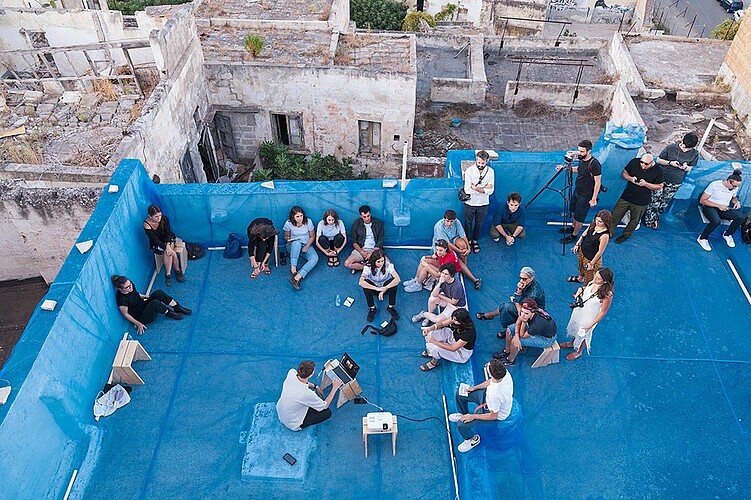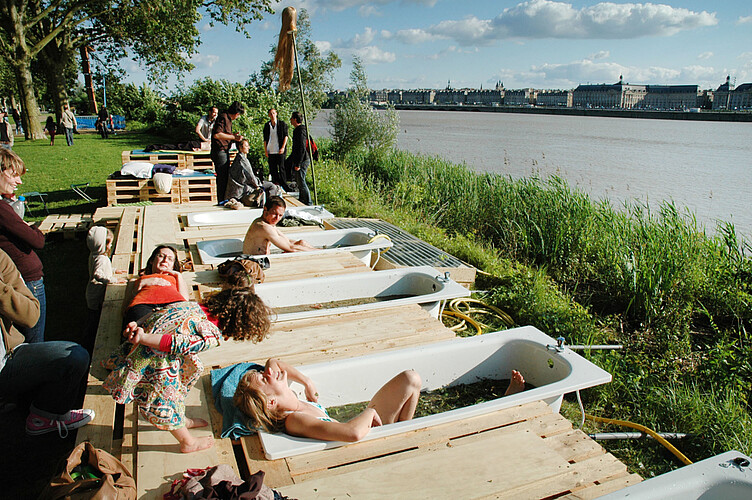studio raumproduktion 22/23: Energy: Yes! Quality: No! (Kopie 1)
Energy: Yes! Quality: No!
COMMONING
What do public spaces have to do with collectivity? Who writes their (invisible) rules and who and how may use them? Who has which access to space? It is an informal meeting space with the supposed "others", with spontaneously emerging groups.Are public spaces really open to all, as the name seems to suggest?
Public spaces are spaces of togetherness and at the same time "in between“ spaces.
When we act in public, it becomes visible that built space - architecture - is much more than its visible, static aspects. Architecture is equal to the process of its production, its reference, its temporality and its relations to society and nature.
BODY
This semester we approach a specific context: the public space on and around Mehringplatz in Berlin Kreuzberg. Through different forms of perception we will explore the space anew and thus reshape our initial transformative intentions - to intervene in public space and to question, change, add to, appropriate it - and to check these intentions again and again with the context in which we work.
We understand space production as dynamic and collective. Space production is a common endeavour.
Our body in space is the first means we have, to physically explore and thus understand a space. We spend 4 intensive days at the beginning of the semester (26.10-29.10) on site: we search for a Metropolitan Trail that connects the university with Mehringplatz, we collaborate with the UdK-wide project InküLe (Innovations in Artistic Teaching) and test the possibilities of augmented reality in public space, we explore the open space with the gardeners and landscape architects of Le Balto. Through the different perceptions of space, new perspectives emerge that enable us to redefine space.
In the course of the semester, we will explore the possible relationships between urban space and bodies and their mutual influence with choreographer Sabine Zahn, while developing collaborative, process-based working models and perception tools with Juan Cachon from the Zuloark collective.
Why are our actions and bodies so often not part of architectural representations? We will explore the drawing technique of the architectural ethnography, recording and collecting large scale and small scale incidents in space, trace everyday practices and corners of hidden comfort – all drawn together into one large drawing of Mehringplatz.
AGENCY
How do I understand a context beyond my quick methods of abstraction? How can I expand my field of action? How can other forms of perception of space help me to create a change of perspective? Changing perspectives induces imagining otherwise – new collective imaginaries might help find alternative futures.
Through transdisciplinary and collaborative work, we learn from other disciplines and practitioners how to explore, understand and design the city from a new perspective. We empower ourselves to act independently of the restrictive structures of society: Agency is power to act. How can I experiment cooperatively with my artistic and knowledge productions according to the principles of self-organisation? What forms of collective action are there? How can we shape our own living and working environment ourselves?
The whole semester becomes a collective "body of work" with different media - performative, graphic, filmic - which makes new forms of collective action visible.
"Energy: Yes!" is the assertion that things which have their own energy are important. Energy is what counts, Energy is what I can grasp, Energy is what I can share and Energy is what is Universal. "Energy: Yes!" is a statement for movement, for the dynamic, for invention, for activity, for the activity of thinking. (...)
"Quality: No!" is the refusal to be neutralized by the exclusive criteria of Quality. Quality is the luxury reflex to keep a distance with everything which doesn't have Quality. I don't know what has Quality, nor where there is Quality. (...) I use the term 'quality' as a negative term, because it excludes others, because it's only an 'international thing' and because it makes the distinction between good and bad."
Thomas Hirschhorn, 2013
Participation in the Collisions in the first week of January is a welcome part of the semester.
register on moodle
FIRST MEETING WED 19.10.–14.00H IN 401
PROJECT DAY WED, 10.30-18.00 PROJECT INTENSE: 26.-29.10.22



